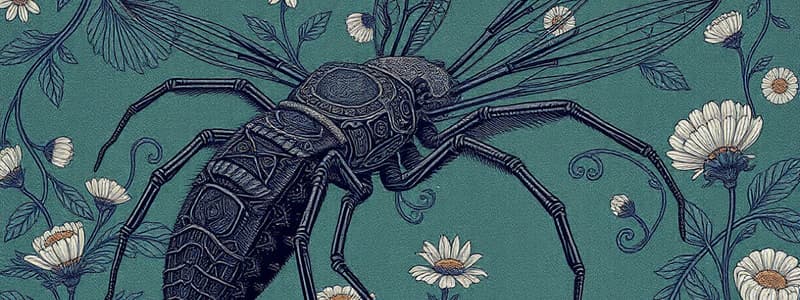Podcast
Questions and Answers
According to the adaptive host manipulation hypothesis, what is the primary reason parasites induce modifications in host phenotypes?
According to the adaptive host manipulation hypothesis, what is the primary reason parasites induce modifications in host phenotypes?
- To maximize the parasite's fitness. (correct)
- To provide the host with better camouflage.
- To ensure the host's reproductive success.
- To decrease the host's lifespan.
In the context of trophically transmitted parasites, how does the manipulation of an intermediate host (IH) by a parasite typically benefit the parasite?
In the context of trophically transmitted parasites, how does the manipulation of an intermediate host (IH) by a parasite typically benefit the parasite?
- By decreasing the intermediate host's mobility.
- By increasing the intermediate host's resistance to predators.
- By increasing the probability of predation by the definitive host (DH). (correct)
- By reducing the competition for resources among intermediate hosts.
For parasites that need their host to move to a different habitat for the parasite (or its propagules) to exit, what kind of manipulation is most likely to occur?
For parasites that need their host to move to a different habitat for the parasite (or its propagules) to exit, what kind of manipulation is most likely to occur?
- Enhancing the host's immune response to fight off other infections.
- Suppressing the host's reproductive capabilities.
- Causing the host to seek out specific resources in a new environment. (correct)
- Decreasing the host's appetite to conserve energy.
How does the manipulation of a vector benefit vector-borne parasites?
How does the manipulation of a vector benefit vector-borne parasites?
In the context of parasitoids that pupate on external substrates, how might manipulation alter the host's behavior?
In the context of parasitoids that pupate on external substrates, how might manipulation alter the host's behavior?
Which of the following is a key factor influencing the evolution of host manipulation by parasites?
Which of the following is a key factor influencing the evolution of host manipulation by parasites?
According to the concept of manipulation sensu stricto, what is the primary focus when studying parasite-host interactions?
According to the concept of manipulation sensu stricto, what is the primary focus when studying parasite-host interactions?
How does the 'mafia-like strategy' manifest in parasite-host interactions?
How does the 'mafia-like strategy' manifest in parasite-host interactions?
In the context of parasitic infections, what does a 'host compensatory response' refer to?
In the context of parasitic infections, what does a 'host compensatory response' refer to?
How do parasites modify host behavior to increase their transmission?
How do parasites modify host behavior to increase their transmission?
What is the effect of morphological manipulation by parasites on their hosts?
What is the effect of morphological manipulation by parasites on their hosts?
How do parasites use physiological manipulation on their hosts?
How do parasites use physiological manipulation on their hosts?
What role do trade-offs play in the evolution of host manipulation?
What role do trade-offs play in the evolution of host manipulation?
How does 'host specificity' influence the evolution of host manipulation?
How does 'host specificity' influence the evolution of host manipulation?
Why can host manipulation evolve relatively rapidly?
Why can host manipulation evolve relatively rapidly?
What is the primary characteristic of 'behavioral manipulation' by parasites?
What is the primary characteristic of 'behavioral manipulation' by parasites?
What broader ecological role might heavily parasitized hosts play within their ecosystem?
What broader ecological role might heavily parasitized hosts play within their ecosystem?
Which factor most directly contributes to the 'coevolutionary arms race' between hosts and parasites?
Which factor most directly contributes to the 'coevolutionary arms race' between hosts and parasites?
Which of the following is a primary goal of investigating host manipulation from an ecological perspective?
Which of the following is a primary goal of investigating host manipulation from an ecological perspective?
How do genetic diversity within parasite populations affect host manipulation?
How do genetic diversity within parasite populations affect host manipulation?
How do environmental factors influence the selection pressures acting on parasites and their hosts?
How do environmental factors influence the selection pressures acting on parasites and their hosts?
What is one potential negative consequence of host manipulation for the host organism?
What is one potential negative consequence of host manipulation for the host organism?
What is the Red Queen Hypothesis?
What is the Red Queen Hypothesis?
Why is it important to view host manipulation as a multidimensional phenomenon?
Why is it important to view host manipulation as a multidimensional phenomenon?
How might parasites influence the nutrient cycle within an ecosystem?
How might parasites influence the nutrient cycle within an ecosystem?
How can morphological manipulation affect the way energy flows through an ecosystem?
How can morphological manipulation affect the way energy flows through an ecosystem?
What role does rapid evolution have in host manipulation?
What role does rapid evolution have in host manipulation?
Why should a scientist utilize the concept of host compensatory response?
Why should a scientist utilize the concept of host compensatory response?
When we are looking at the concept of behavioral manipulation what can we analyze?
When we are looking at the concept of behavioral manipulation what can we analyze?
In the context of trophically transmitted parasites, which of the following is a likely outcome of host manipulation?
In the context of trophically transmitted parasites, which of the following is a likely outcome of host manipulation?
For parasites that depend on vectors for transmission, what is the most common form of host manipulation?
For parasites that depend on vectors for transmission, what is the most common form of host manipulation?
How do parasites alter the morphology of their hosts in order to benefit?
How do parasites alter the morphology of their hosts in order to benefit?
Flashcards
Adaptive Host Manipulation
Adaptive Host Manipulation
Hypothesis stating that parasites induce host phenotype modifications to maximize their own fitness.
Trophic Transmission Manipulation
Trophic Transmission Manipulation
The behavior or appearance of the intermediate host is manipulated to increase the likelihood of transmission to the definitive host through predation.
Habitat Alteration Manipulation
Habitat Alteration Manipulation
Parasites manipulate hosts to move to a different, more suitable habitat to facilitate their exit or release of propagules.
Vector-borne Manipulation
Vector-borne Manipulation
Signup and view all the flashcards
Parasitoid Pupation Manipulation
Parasitoid Pupation Manipulation
Signup and view all the flashcards
Natural Selection in Host Manipulation
Natural Selection in Host Manipulation
Signup and view all the flashcards
Coevolution in Parasitism
Coevolution in Parasitism
Signup and view all the flashcards
Genetic Variation in Parasite Manipulation
Genetic Variation in Parasite Manipulation
Signup and view all the flashcards
Life Cycle Manipulation
Life Cycle Manipulation
Signup and view all the flashcards
Trade-Offs in Host Manipulation
Trade-Offs in Host Manipulation
Signup and view all the flashcards
Host Specificity
Host Specificity
Signup and view all the flashcards
Environmental Factors in Parasitism
Environmental Factors in Parasitism
Signup and view all the flashcards
Rapid Evolution of Manipulation
Rapid Evolution of Manipulation
Signup and view all the flashcards
Manipulation sensu stricto
Manipulation sensu stricto
Signup and view all the flashcards
Mafia-like Strategy
Mafia-like Strategy
Signup and view all the flashcards
Host Compensatory Response
Host Compensatory Response
Signup and view all the flashcards
Behavioral Manipulation
Behavioral Manipulation
Signup and view all the flashcards
Morphological Manipulation
Morphological Manipulation
Signup and view all the flashcards
Physiological Manipulation
Physiological Manipulation
Signup and view all the flashcards
Study Notes
- Parasites can induce modifications of host phenotypes
Adaptive Host Manipulation Hypothesis
- Modifications maximize parasite fitness
- Reproductive success
- Survivability
Significance of Host Manipulation to Parasites
- Trophically transmitted parasites can manipulate the behavior/appearance of an intemediate host, increasing the probability of transmission by predation to the definitive host
- Parasites that must exit the host or release their propagules into other habitats can manipulate the host to move to a more suitable habitat
- Vector borne parasites can manipulate the vector inducing it to visit more hosts, which then allows transmission of the parasites
- Parasitoids exit their host and pupate on external substrates; manipulation can alter the behavior of the host to protect the parasite from danger
Evolution of Host Manipulation; Key Factors
- Natural Selection: Parasites that manipulate hosts improve their own fitness
- Coevolution: Hosts and parasites adapt through an ongoing coevolutionary arms race
- Genetic Variation: Genetic diversity provides potential traits that may enhance host manipulation
- Life Cycle Requirements: Parasites manipulate hosts to facilitate their own life cycle
- Trade-offs: Trade-offs may exist with manipulation
- Host Specificity: Host manipulation is influenced by the specificity of the parasite-host relationship
- Environmental Factors: Conditions can influence selection pressures on parasites and hosts
- Rapid Evolution: Short generation times cause host manipulation to evolve fast
Evolution of Host Manipulation; Concepts
- Manipulation sensu stricto describes the direct parasite influence on hosts to enhance transmission or survival
- Focus is on understanding how parasites employ manipulation strategies of behavior, physiology, and traits to their advantage
- Mafia-like Strategy: Hosts comply to avoid parasite coercion or manipulation
- Host Compensatory Response: Instead of direct parasite action, the host's infection response leads to alterations indirectly benefiting the parasite
Types and Mechanisms of Host Manipulation
- Behavioral Manipulation: Parasites modify host behavior to increase transmission and fitness
- Morphological Manipulation: Impaired locomotor performance enhances transmission via the food chain
- Physiological Manipulation: Parasites can create negative effects on the host's physiology
Examples
- Microphallus papillorobustus
- Schistocephalus solidus
- Pomphorynchus laevis
- Toxoplasma gondii
- Spinochordodes tellinii
- Myrmeconema sp.
- Confluaria podicipina
- Leucochloridium paradoxum
- Gasteromermis sp.
Studying That Suits You
Use AI to generate personalized quizzes and flashcards to suit your learning preferences.




